- CERES Home
- →
- School of Management (SoM)
- →
- Staff publications (SoM)
- →
- View Item
JavaScript is disabled for your browser. Some features of this site may not work without it.
| dc.contributor.author | Guest, Paul M. | - |
| dc.contributor.author | Sutherland, Dylan | - |
| dc.date.accessioned | 2012-07-09T23:00:53Z | |
| dc.date.available | 2012-07-09T23:00:53Z | |
| dc.date.issued | 2010-07-10T00:00:00Z | - |
| dc.identifier.citation | Paul Guest and Dylan Sutherland, The impact of business group affiliation on performance: evidence from China's 'national champions', Cambridge Journal of Economics, 2010, Volume 34, Issue 4, Pages 617-631. | |
| dc.identifier.issn | 0309-166X | - |
| dc.identifier.uri | http://dx.doi.org/10.1093/cje/bep017 | - |
| dc.identifier.uri | http://dspace.lib.cranfield.ac.uk/handle/1826/5001 | |
| dc.description.abstract | An important aspect of China's economic reforms has been an ambitious policy to develop 100 or so large, internationally competitive business groups. Very little is known about these national champion groups or the benefits to subsidiary firms of belonging to them. This study, building from insights and methods used in existing literature, examines the performance of subsidiaries affiliated to China's national champion groups. Our results find that they perform comparatively well. We discuss possible reasons for this finding and comment more generally on the important role that business groups now play in China's reform and development. | en_UK |
| dc.publisher | Oxford University Press | en_UK |
| dc.title | The impact of business group affiliation on performance: evidence from China's 'national champions' | en_UK |
| dc.type | Article | - |
Files in this item
This item appears in the following Collection(s)
-
Staff publications (SoM) [1260]
